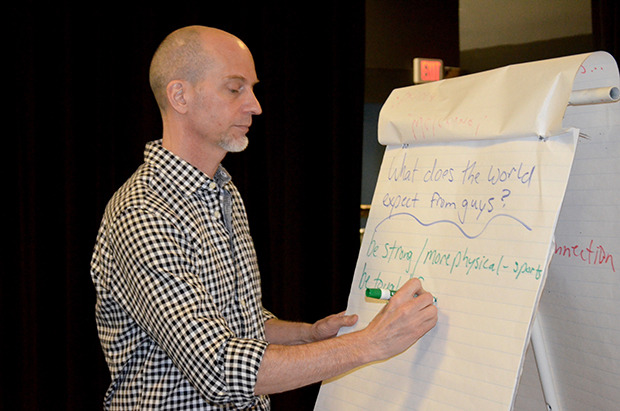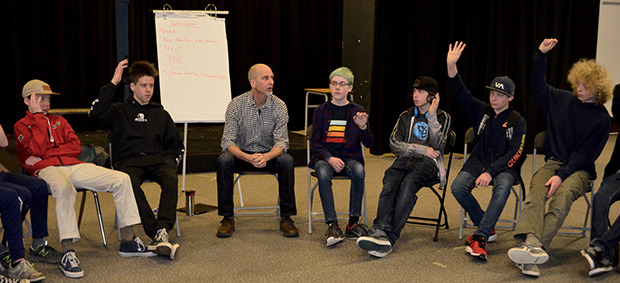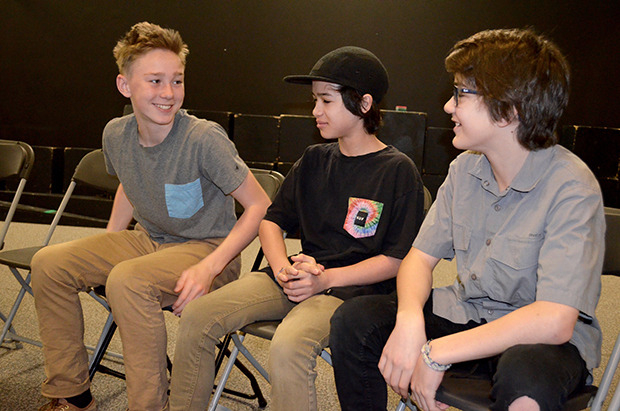This week, Vancouver-based facilitator, David Hatfield, worked with our Grade 8 boys as part of our Health Relationships, Healthy Living workshops. Hatfield’s long-standing areas of focus including masculinity, conflict transformation, and rites of passage were on display as he worked with small groups of boys ages 13-14 year olds. The purpose of David’s visit was twofold: start the school-wide conversation in our school around gender identity and masculinity, and offer grounding for our boys (as future young men) as they (admittedly at times) struggle to find their place in the transformational multi-gendered spaces of our society. David’s modus-operandi for reaching out to our school in February was neatly and succinctly captured in an article by Will Johnson. Thanks to both the Trafalgar PAC and District PAC for their support of David’s work with our youth.
 |
| Vancouver facilitator, David Hatfield, helps our boys to see ‘The Script’. (Will Johnson photo) |
Hatfield is very upfront with the group of students about why he does the work he does: the expectations that society places on men, and specifically, young boys the road towards adulthood is anything by productive. He shared that young boys are faced with a myriad of role characteristics around masculinity; he refers to this as ‘The Script’. Seeing the boys react to his call for their thoughts about how they are ‘expected to be’. Hatfield aptly set the stage for the group asking them to keep the conversation within the group, and respect each others thoughts and offerings. Surprisingly, most of the boys were not shy about sharing their ideas around what or how a man and/or boy is supposed to hold. One student offered the phrase ‘playing the stereotype’ to the group. Lots of head nods. Hatfield believes that boys are intuitively aware of the concept of ‘masculinity’ as a society construct. But what many young males lacking are the necessary conditions that help them to make healthy choices around sexuality, gender, relationships, appearance, etc. (i.e. immunity against ‘The Script’).
 |
| Most of the boys were not shy about sharing what roles society expects from them. (Will Johnson photo) |
The next day, Hatfield deftly facilitated a men’s circle at a local retreat facility. With eighteen men from various occupations, lifestyles, and interests gathered David asked them what they felt they needed from him. What were the issues that brought them to the gathering? It quickly became evident that these men (ages 24-72 years) were there for one reason: to help our boys. At the circle, I shared with the group my personal struggles with our own burgeoning teenage boy who coincidentally worked with David at his respective school earlier in the week. (Hatfield spent the entire week in the Nelson-area working and connecting with several schools, groups, and hundreds of male tweens and teens.)
Ultimately, my brief time with Hatfield, our students, parents, and members from our men’s gathering that week helped to reaffirm a long held belief that quite often gets buried under long hours at work, difficult decisions with students (mostly male, mostly at-risk) and their families, advocating for our boys with teachers and other community support services: privilege. It made me realize (or more appropriately, rediscover) the immense responsibility that all of us working with our boys possess: making sure that we are listening, offering guidance and support to them along what is often a tumultuous and harried time of social, mental, and physiological development.
We must never lose sight of the fact that it is a privilege to be given opportunities to work other people’s kids. Simultaneously, there is a recognition of the enormous amount of time and energy invested by those working with our young men and men-to-be. It is also difficult to ignore one of Hatfield’s guiding principles: investments in our boys benefit all of us including both female members of society, those struggling with to find an identity in the ever-evolving definition of gender, and on society as a whole.
The effects that positive male role models (or a lack thereof) have on our young, often rudderless young males, can never be overstated or overemphasized. I was recently involved an amazing water-cooler conversation with two fellow male colleagues and our thoughts of our boys in crisis resonated powerfully. We agreed on several items (similar to those mentioned above), but it was the need to get our boys outside with positive male role models that stirred the conversation. We vowed to attempt to provide these opportunities next year at our school: a very simple proposition based in sound research with profound impacts. And at the very least, we agreed, it was our hope that this would be the start of many different conversations at school among teachers, support staff, and administration.
 |
| The school has begun to support its boys by beginning conversations around ‘masculinity’ and gender role identities. (Will Johnson photo) |
It is very exciting to note that David will be returning to work with our school and its male students twice (fall and spring) next year. With the continued support of both the school PAC and district PAC, we hope to create a long-term, sustainable relationship with Hatfield as he continues to support the people that support our young-men-in-development.

Excellent Post. Thanks for Sharing…
LikeLike